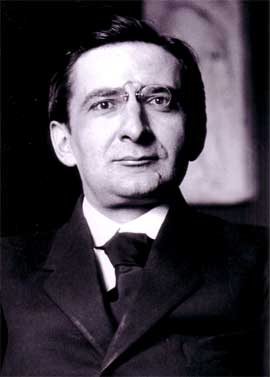Responses to Louis Lavelle’s “The Act of Loving”: A Call and Response Part I: Participation in Love by Wally Swist
“[Presence is] the discovery of one’s own being through contact with another.”
– Louis Lavelle
In my attempt to try to understand where I was with regard to caregiving my partner, especially with there being a decline and deterioration in her condition of dementia, I had the opportunity to read the French philosopher Louis Lavelle’s (1883–1951) The Act of Loving and find within myself a “call and response” to specific parts of the work that resonated with me. These resonances led to my own insights regarding the caregiver and the act of loving. The quotes below appear from a new translation of Lavelle’s book by Robert Alan Jones, an Australian who is considered an authority on Lavelle.

Louis Lavelle in 1920
Today’s American Catholic editor Michael Centore mentioned in an email to me that Lavelle’s philosophy was making a comeback, and that it was not dissimilar from Dorothy Day’s idea of “personalism” and the ethos of the Catholic Worker movement. Personalism is described by Daniel Akst in his December 2020 article in Reason, entitled “Dorothy Day: Personalist Hero,” in which he writes: “Day’s intense personalism was evident in her suspicion of hierarchy, bureaucracy, and far-off authorities.”
However, Day’s personalism is probably best elucidated in the anecdote with which the article concludes, relayed by Robert Ellsberg in his book Revolution of the Heart: “[T]he only question that occurred to me was, how do you reconcile Catholicism and anarchism? And she just kind of looked at me and said, ‘It’s never been a problem for me.’” This obviates the inference that Catholicism and anarchism are irreconcilable, and if this is so, then it would give way to the thought that the love Christ practiced and taught us to follow was a form of anarchism. In taking this one step further, the “act of loving” which Lavelle addresses may also be thought about in this way, since he interprets love in his experience of it as a Christian mystic.
In a similar fashion as the German intellectual and philosopher Walter Benjamin sometimes made use of a text and his elaboration and interpretation of it, I use Louis Lavelle’s The Act of Loving, with significant appreciation to Robert Alan Jones and his translation from the French. This text of Lavelle’s has not been translated before, largely due to its grammatic complexity and enormous intellective breadth. Each passage quoted is an inspired call to me by Lavelle, followed by my own response to it that reflects upon my being a caregiver to my partner.
♦ ♦ ♦
“Whatever we are inclined to comprehend and love is what our situation in the world has placed on our path and proposes for our participation.”
I found this sentence to be a diamond of Lavelle’s thinking and philosophy. I remember reading him 25 years ago and more, and what I most recall about his work is his admonishment that we are, indeed, ready for whatever it is that comes our way. However, the sentence above not only refines that message but also infers that it is “our participation” in whatever comes our way that is significant and important. The resonance of the sentence in me also abounds with how we become aware of our “participating in God’s being.”
“When we love ourselves, it is he who loves us, or that in us which participates in him.”
This is another gem of a sentence. And I understand, from a distance, how difficult this translation from the French must have been. However, we have mined such rich Lavelle material before in his understanding that it is God who loves us “when we love ourselves.” However, what appears to supremely emerge out of this sentence is the notion of “what participates” in God.
“Thus, if we find in the action of creative power always the same ubiquitous love, everywhere offered, the very love that lifts us toward it as toward the condition of our being and growth but is identical with the One whose creative power calls us into being, then we are obliged to find in other consciousnesses, at the moment they are realised, an example and a means that invites us to reach beyond ourselves and, through a mutual mediation, to realise ourselves along with them; and the love we have for them is no more than a continuation of that movement of love which is the origin of creation. It reflects it, so to speak, throughout its work.”
I believe Lavelle really articulates what love is here. It is the syntax of the sentence through which he weaves the threads of his articulation of love. In the end he mines the thought that what we have is “a continuation of that movement of love which is the origin of creation,” and which extends by “reflect[ing] throughout its works.” Love—and loving—was, is, and ever will be eternal.
“The synthesis of the one and the diverse is therefore no longer brought about here by a theoretical operation but by a living act, which is love. Thus, one can say that love establishes a link between the parts of the All, and between those parts and the All, and that it is even responsible for there being an All and its parts. It is therefore the principle of all syntheses.”
This passage is where Lavelle really works it all out for us. In fact, what I would call phenomenological thinking is also one lyrical tautology after another. This is Lavelle’s writing, and Robert Alan Jones’s translating, in which Lavelle truly connects us all universally and in a way in which the language quite memorably sings. This passage begins with synthesis and concludes with it. The language embodies synthesis, which can also be thought about as “the act of loving.”
“For we need to restore the high significance of the most beautiful words and not lower them to their common uses. And it will be seen that what I am looking for here is much less the promise of an advantage than the possibility of a sacrifice. In true love, I offer myself completely to being possessed rather than to trying to possess. There is always in the will to be loved an appetite for sacrifice. That is the point that perhaps best marks the difference between desire, which only thinks to take, and love, which only thinks to give, i.e., to give oneself.”
With respect “to give oneself,” I have done this for Tevis, my partner, who is in advancing stages of dementia. She has been quite antagonistic recently. Fortunately, I am able to phone her dementia therapist, who helps us through conflict to “deescalate” the situation.
Today Tevis kicked me several times. She won’t remember this. The dispute was over my having taken over the care of her taxes several years ago (by sending materials to her tax preparer in another town), and Tevis “wanted to be in the loop” after I told explicitly what I was doing. But she lost her temper and I lost mine, too. She kicked me several times and drew back as if to hit me before she gained some hold of herself again.
To coin a term, “a torment without reprieve” is not overstating the situation I find myself in: damned whatever I do, even and especially, it seems, when I choose the high road. It is in choosing to continue to give that I remind myself of how I also continue to love.
“Also, it must be said that no love is truly unhappy, for it seems to us that it is not the being we love who responds to us, it is God.”
I need to admit that I don’t always necessarily feel “love” for Tevis, but I do feel what I term as “being devoted to my caregiving for her.” My friend the Amherst poet Michael Miller has substituted this, from his observance, and has stated that it is my “loyalty” to Tevis—that I have been, and am, loyal to her.
This is something I respond to when seen through the lens of Lavelle’s quote that “no love is truly unhappy.” The last clause of the sentence clarifies that “it is not the being we love who responds to us, but God.” Hence, God is responding to me, even through the haze of Tevis’s dementia. The Tevis I knew is present less and less, and what I see breaking through in her is God—not in what we often think of as goodness or evil, but God. And that in itself is nothing less than humbling. ♦
Wally Swist’s recent books include Taking Residence (Shanti Arts, 2021), Evanescence: Selected Poems (Shanti Arts, 2020), and On Beauty: Essays, Reviews, Fiction, and Plays (Adelaide Books, 2018). His book A Bird Who Seems to Know Me: Poems Regarding Birds & Nature was the winner of the 2018 Ex Ophidia Press Poetry Prize and published in 2019. A Writer’s Statements on Beauty: New and Selected Essays and Reviews was published by Shanti Arts in April 2022. His previous essays on caretakeing, “Participating in God’s Being” and “Transforming Responsive Caregiving into Seeds of God,” may also be of interest to readers.





Leave a Reply
Want to join the discussion?Feel free to contribute!